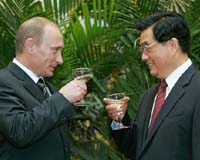| . |  |
. |
Moscow (AFP) June 17, 2009 The leaders of China and Russia on Wednesday vowed to beat the economic crisis by bolstering strong ties, as they put a brave face on a slowdown that has seen bilateral trade plummet. The warm smiles and optimistic statements were aimed at emphasising the strength of Moscow-Beijing relations and how they have recovered from the Cold War when the main Communist powers eyed each other with suspicion. "In the midst of the global financial crisis, we are actively developing a practical cooperation in every sphere," Chinese President Hu Jintao said at the start of a state visit to Moscow. "China will always look at its relations with Russia as a priority of its foreign policy," he told strongman Prime Minister Vladimir Putin. Russian President Dmitry Medvedev after his meetings with Hu also underscored the importance of coordinated regional measures to combat the global crisis. "Of course, today our attention is centred on those measures necessary to prevent or minimise the negative influences of the global financial crisis, which of course have an effect on our bilateral ties," Medvedev said. "The main goal is not only to preserve the relations existing between our states, but to give them a new impulse," he added. Medvedev hailed Hu's visit as "friendly and constructive," adding these were qualities "that characterise relations between our two countries." The Chinese president ended his talks with the Russian for "Thank You". Both countries have taken great strides to put old rivalries behind them, ending just last year a decades-long dispute over their 4,300-kilometre (2,700-mile) border. Medvedev and Hu signed a packet of accords for future cooperation including in the sphere of natural gas and coal. Yet bilateral trade has now taken a major hit from the economic crisis, falling 42 percent to 7.3 billion dollars for the first quarter of 2009 compared with the same period last year, Russia's trade envoy to Beijing said. Medvedev and Putin did not mention these figures, instead citing bilateral trade with China worth over 55 billion dollars in 2008. China and Russia also agreed to boost the use of their domestic currencies in trade, Medvedev added, as Moscow seeks to lessen the global dominance of the US dollar. "Another very important task -- which today has become very timely -- is the question of using national currencies in mutual payments," he said. "We agreed to take additional measures in this direction." But even as the two leaders hailed their growing energy relations, Russian energy monopoly Gazprom said Wednesday that a planned gas pipeline to China had been delayed until after 2011. "Talks are ongoing, we haven't yet agreed on the price. Already, we are no longer talking about 2011," as a deadline for the Altai pipeline linking the two countries where their borders meet in Western Siberia, Gazprom CEO Alexei Miller said. The two countries, which normalised ties in 1989, also signed a deal only last year to build an oil pipeline, which will run from Siberian fields via Russia's Far East to energy-hungry China, after talks on the project began in the 1990s. "We have started a complex cooperation in the oil sphere and reached an important breakthrough in the energy sphere," Hu said. Diplomatic ties between the two permanent members of the UN Security Council have been founded on a common stance on issues from the Iranian and North Korean nuclear programmes to the Middle East, Sudan and non-proliferation. And while the two countries compete for influence over energy resources in Central Asia, they have built up cooperation in regional clubs that aim to balance against US hegemony. Hu travelled to Russia's Ural-mountain city of Yekaterinburg this week for a summit of the Shanghai Cooperation Organisation, which groups Russia and China with four Central Asian states and aims to be a counterweight to NATO. Share This Article With Planet Earth
Related Links Learn about the Superpowers of the 21st Century at SpaceWar.com Learn about nuclear weapons doctrine and defense at SpaceWar.com
 China and Russia: friends and rivals
China and Russia: friends and rivalsBeijing (AFP) June 15, 2009 Chinese President Hu Jintao will seek to cement friendly ties with Russia during his state visit starting Wednesday, observers say, but the relationship is still marked by lingering rivalries. During the rule of Mao Zedong, China was under the thumb of the Soviet Union, but today the roles have been reversed -- a rising China is now the world's third largest economy, far ahead of Russia in ... read more |
|
| The content herein, unless otherwise known to be public domain, are Copyright 1995-2009 - SpaceDaily. AFP and UPI Wire Stories are copyright Agence France-Presse and United Press International. ESA Portal Reports are copyright European Space Agency. All NASA sourced material is public domain. Additional copyrights may apply in whole or part to other bona fide parties. Advertising does not imply endorsement,agreement or approval of any opinions, statements or information provided by SpaceDaily on any Web page published or hosted by SpaceDaily. Privacy Statement |